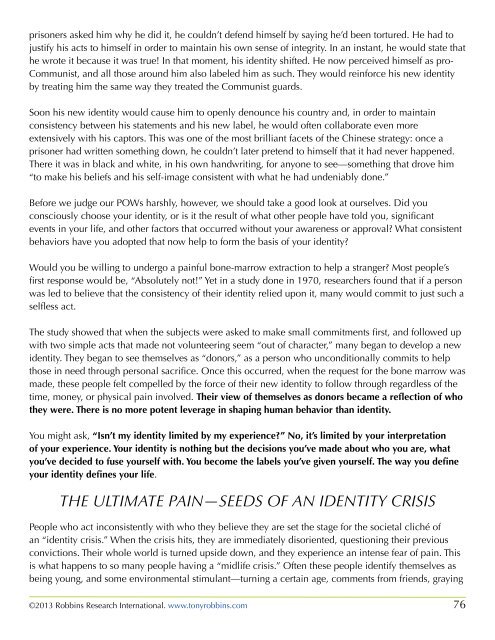Tony Robbins -Re-Awaken_the_Giant_Within
- No tags were found...
Create successful ePaper yourself
Turn your PDF publications into a flip-book with our unique Google optimized e-Paper software.
prisoners asked him why he did it, he couldn’t defend himself by saying he’d been tortured. He had to<br />
justify his acts to himself in order to maintain his own sense of integrity. In an instant, he would state that<br />
he wrote it because it was true! In that moment, his identity shifted. He now perceived himself as pro-<br />
Communist, and all those around him also labeled him as such. They would reinforce his new identity<br />
by treating him <strong>the</strong> same way <strong>the</strong>y treated <strong>the</strong> Communist guards.<br />
Soon his new identity would cause him to openly denounce his country and, in order to maintain<br />
consistency between his statements and his new label, he would often collaborate even more<br />
extensively with his captors. This was one of <strong>the</strong> most brilliant facets of <strong>the</strong> Chinese strategy: once a<br />
prisoner had written something down, he couldn’t later pretend to himself that it had never happened.<br />
There it was in black and white, in his own handwriting, for anyone to see—something that drove him<br />
“to make his beliefs and his self-image consistent with what he had undeniably done.”<br />
Before we judge our POWs harshly, however, we should take a good look at ourselves. Did you<br />
consciously choose your identity, or is it <strong>the</strong> result of what o<strong>the</strong>r people have told you, significant<br />
events in your life, and o<strong>the</strong>r factors that occurred without your awareness or approval? What consistent<br />
behaviors have you adopted that now help to form <strong>the</strong> basis of your identity?<br />
Would you be willing to undergo a painful bone-marrow extraction to help a stranger? Most people’s<br />
first response would be, “Absolutely not!” Yet in a study done in 1970, researchers found that if a person<br />
was led to believe that <strong>the</strong> consistency of <strong>the</strong>ir identity relied upon it, many would commit to just such a<br />
selfless act.<br />
The study showed that when <strong>the</strong> subjects were asked to make small commitments first, and followed up<br />
with two simple acts that made not volunteering seem “out of character,” many began to develop a new<br />
identity. They began to see <strong>the</strong>mselves as “donors,” as a person who unconditionally commits to help<br />
those in need through personal sacrifice. Once this occurred, when <strong>the</strong> request for <strong>the</strong> bone marrow was<br />
made, <strong>the</strong>se people felt compelled by <strong>the</strong> force of <strong>the</strong>ir new identity to follow through regardless of <strong>the</strong><br />
time, money, or physical pain involved. Their view of <strong>the</strong>mselves as donors became a reflection of who<br />
<strong>the</strong>y were. There is no more potent leverage in shaping human behavior than identity.<br />
You might ask, “Isn’t my identity limited by my experience?” No, it’s limited by your interpretation<br />
of your experience. Your identity is nothing but <strong>the</strong> decisions you’ve made about who you are, what<br />
you’ve decided to fuse yourself with. You become <strong>the</strong> labels you’ve given yourself. The way you define<br />
your identity defines your life.<br />
THE ULTIMATE PAIN—SEEDS OF AN IDENTITY CRISIS<br />
People who act inconsistently with who <strong>the</strong>y believe <strong>the</strong>y are set <strong>the</strong> stage for <strong>the</strong> societal cliché of<br />
an “identity crisis.” When <strong>the</strong> crisis hits, <strong>the</strong>y are immediately disoriented, questioning <strong>the</strong>ir previous<br />
convictions. Their whole world is turned upside down, and <strong>the</strong>y experience an intense fear of pain. This<br />
is what happens to so many people having a “midlife crisis.” Often <strong>the</strong>se people identify <strong>the</strong>mselves as<br />
being young, and some environmental stimulant—turning a certain age, comments from friends, graying<br />
©2013 <strong>Robbins</strong> <strong>Re</strong>search International. www.tonyrobbins.com 76


